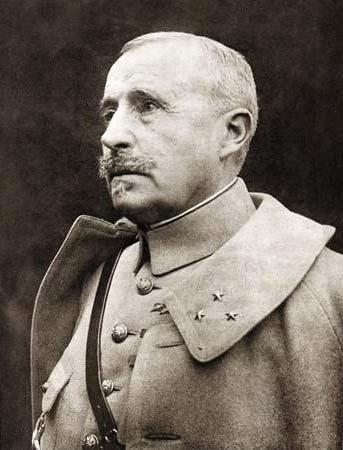Many have heard this emotional appeal in Spanish, but not everyone knows what “But Pasaran!” Means, and, of course, they do not remember the author and the situation in which he appeared. "But Pasaran!" translates as "They will not pass!" from spanish.
Initially, this phrase was perceived as a statement of a rigid unshakable upholding of the territorial borders of one’s country, political positions and unbreakable ideals. Authorship is attributed to famous personalities of the early 20th century - the French general and the Spanish communist.
France: Robert Georges Nivelles
The French version of the phrase was pronounced by divisional general Robert Georges Nivelles during the First World War (1914-1918). He was the commander of the Verdun sector of the Western Front, and later - the commander in chief of the entire French army. These words were spoken by him on the Western Front during the Battle of Verdun.

The Verdun operation became the largest and bloodiest battle in the history of the First World War. All material and human forces of opponents were used to the maximum. Both the French and German troops fought not for life, but for death. Later, such military tactics was called the “war of attrition”, when constant attacks deenergize the enemy, and the one who has large reserves wins. In such conditions, the emotional and moral support of soldiers and officers who were in the active combat zone for many months in a row was very important. And the phrase, which became winged, supported the fighting spirit of the French warriors, who courageously defended their native land from German invaders. The slogan was actively used by state political propaganda even after the end of the war on military posters and emblems, in patriotic songs.
Spain: Dolores Ibarruri Gomez
How does “But Pasaran!” Translate? The winged expression entered the Russian language after it was pronounced by an active public figure Dolores Ibarruri Gomez during the Spanish Civil War between Republicans and Nationalists (1936-1939). Dolores Ibarruri Gomez (party name - Passionaria) is an activist of the Spanish and international communist movement, an active participant in the republican movement during the Civil War in Spain.
In July 1936, the Passionaria spoke on the radio and in her
fiery speech called on the Spanish people to unite and resist the military rebels, eager for power under the leadership of General Francisco Franco. Then she uttered this warlike cry: "They will not pass!"
And the outbreak of civil war actually took place under this significant exclamation. It is believed that after the appearance and dissemination of this high-profile phrase, the Republicans came up with its continuation: "Pasaremos!", Which means "We will pass!".
For three whole years, the people's war between the Republicans and the French nationalists continued, killing more than 500 thousand Spaniards. Before its end, after the fall of Madrid, Francisco Franco answered Dolores Ibarruri and all the defeated Republicans: “Chemos Pasado!”, Which translates as “We passed!”. For many years, the fascist dictatorship of Franco was established in Spain. But the expression "But Pasaran!" and a raised hand with a tightly clenched fist has since become iconic symbols of the world anti-fascist and liberation movement.
After the defeat in the Civil War, Dolores Ibarruri Gomez emigrated to the USSR, where she actively participated in the work of the foreign opposition to the dictatorship of Franco. She managed to return to her homeland only in 1975 after the death of the dictator and the beginning of political change in Spain.
The meaning of the phrase in the modern world
Political slogans often turn into everyday language in the previous verbal form. But at the same time, they radically change their meaning, absolutely losing their ideological implication. Usually the phrase becomes playful or ironic.
What does the expression "But Pasaran!" in modern world? Having lost the political foundation, now this popular expression speaks of a willingness to actively oppose its opponents, competitors, enemies, and implies the presence of an irresistible desire to become a winner. Sometimes, in a comic manner, they say so when they want to support a person on the way out of some simple or ridiculous situation.
The use of expression in popular culture
The slogan has been used many times in the lyrics of contemporary artists. But unfortunately, most often the authors did not have a full understanding of what "But Pasaran!" or they endowed this expression with a meaning known only to themselves. For example, rock musician Gleb Samoilov once sang a song called “But Pasaran”, and the fashionable rap group “AK-47”, together with singer Noggano, sang another song, but with the same name.
Unlike Russian musicians, the Soviet writer Nikolai Shpanov perfectly understood what “But Pasaran!” Means. His action-packed novel “Arsonists. “But Pasaran!” ”Is a striking example of anti-fascist military-historical prose, telling about the time before the outbreak of World War II.
Misconception about the origin of the phrase.
What does it mean, “But Pasaran!” for modern students? If they do not learn Spanish, then probably the authorship and historical situation that preceded the expression is usually completely unknown to them. And middle-aged people who have long graduated from school often mistakenly connect the origin of this slogan with the life and active work of the Cuban revolutionary Ernesto Che Guevara (1928-1967). Apparently, the European slogan is associatively associated with the language spoken by the Cuban politician. Thus, historical accuracy is distorted, giving rise to myths and conjectures.